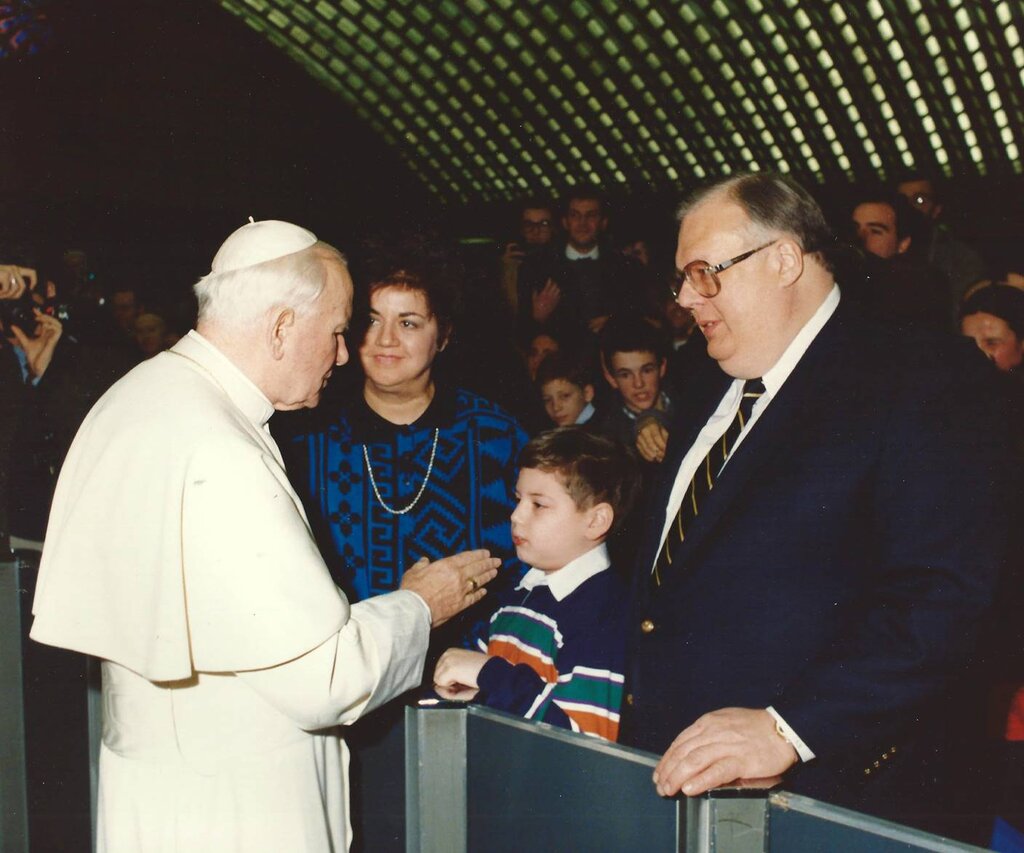CHICAGO (IL)
New York Times [New York NY]
May 5, 2021
By Sam Roberts
He advised four Chicago cardinals and advanced the U.S. bishops’ zero-tolerance policy toward clergy guilty of sex crimes.
[Photo above: James A. Serritella with Pope John Paul II in 1997. His influence extended from the National Conference of Catholic Bishops to the U.S. Supreme Court. Credit via Serritella family]
James A. Serritella, a lapsed seminarian who as counsel to four cardinals overseeing the Archdiocese of Chicago encouraged them and eventually the U.S. Conference of Catholic Bishops to bar priests credibly accused of sexually abusing children, died on April 23 in Chicago. He was 78.
His death, in a hospital, was announced by Cardinal Blase J. Cupich. The cause was complications of heart disease.
Working with Cardinal Joseph Bernardin in 1992, Mr. Serritella was a key architect of the archdiocese’s Office of Assistance Ministry, set up for victims of abuse, and helped establish its board, which, dominated by lay people, assesses allegations of abuse by clergy.
“In terms of the victims’ assistance ministry, he was the one who took the lead in making sure it became a reality,” Cardinal Cupich said in phone interview. “He believed that the church had a voice for the common good that was being jeopardized and squandered if we did not address this crisis head on.”
One year after starting the ministry, Cardinal Bernardin himself was accused of misconduct in a lawsuit by a 34-year-old man who said he had been sexually abused by the prelate as a seminary student 17 years earlier. Mr. Serritella successfully defended the cardinal against those charges. The cardinal was exonerated after the accuser recanted.
Mr. Serritella’s framework for protecting children from abuse and priests from unwarranted accusations became a model for the charter adopted in 2002 by the national bishops conference.
That policy held that any priest or deacon who committed “even a single act of sexual abuse” would be removed permanently from the ministry. But the policy disappointed many victims’ advocates, who said it didn’t go far enough because it allowed the proceedings to remain secret and let clergymen challenge disciplinary outcomes.
Jeff Anderson, a leading lawyer for abuse victims, described Mr. Serritella in a phone interview as a “quite honorable and powerful intellect’’ who, because he was committed to his client, the archdiocese, “sometimes appeared to be part of the problem.”
But, Mr. Anderson added, Mr. Serritella was devoted to helping the archdiocese “be better when it came to this issue, and had a profound influence in saving the archdiocese millions of dollars in liability and in getting ahead of the curve in how they dealt with the crisis of sex abuse.”
In 2006, the Chicago archdiocese released a list of priests against whom allegations of sexual abuse had been substantiated. In 2014, some 20,000 pages of documents related to those cases were made public.
As the archdiocese’s chief outside counsel for 50 years, Mr. Serritella held sway well beyond a single jurisdiction and one subject. In the mid-1970s he helped draft a bill enacted by the Illinois General Assembly requiring the state to pay the full cost of social services, like foster care, that were provided by private organizations, both secular and religious, like Catholic Charities.
In a brief, he persuaded the United States Supreme Court to rule in 1979 that teachers in church schools who conduct classes in both religious and secular subjects were exempt from the provisions of the National Labor Relations Act concerning unionization and other job guarantees, which the archdiocese said would have further strained its budget.
Mr. Serritella served the archdiocese under Cardinals John Cody and Francis E. George in addition to Cardinals Bernardin and Cupich.
He also represented Hindu, Jewish and Protestant religious institutions and was invited to Eastern Europe to consult about religious freedom after the collapse of Soviet Communism.
He was a founder of the DePaul University College of Law Center for Church/State Studies in Chicago and the Center for Migration Studies in New York, an educational research group.
James Anthony Serritella was born on July 8, 1942, on Chicago’s West Side to Anthony Serritella, a clerk with the city’s Board of Education, and Angela (DeLeonardis) Serritella, a homemaker who also worked in a Catholic high school cafeteria.
He began studying for the priesthood when he was 13, with the Missionaries of St. Charles, an order also known as the Scalabrinians that serves refugees and migrants. He earned a bachelor’s degree from St. Charles Seminary on Staten Island in 1965 and another in philosophy and theology from the Pontifical Gregorian University in Rome in 1966.
At 24, before he was ordained, he decided to discontinue studies for the priesthood, he later wrote, because of his “desire to enter public life and work in the public arena to make a better world.”
After he returned from Rome, Mr. Serritella continued his education at the University of Chicago, where he received a master’s from the interdisciplinary Committee for the Analysis of Ideas and Study of Methods in 1968 and a law degree in 1971. He was a partner in the Chicago firm Burke, Warren, MacKay & Serritella.
He married Ruby Ann Amoroso in 1981. She was a clinical nurse specialist in cardiothoracic surgery and a lecturer on nursing, and died in 2009. He is survived by their son, Dr. Anthony Ventu Serritella, and a sister, Camille Vena.
Sam Roberts, an obituaries reporter, was previously The Times’s urban affairs correspondent and is the host of “The New York Times Close Up,” a weekly news and interview program on CUNY-TV. @samrob12

